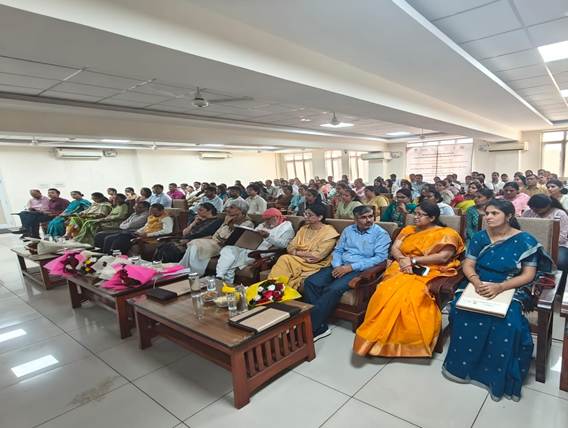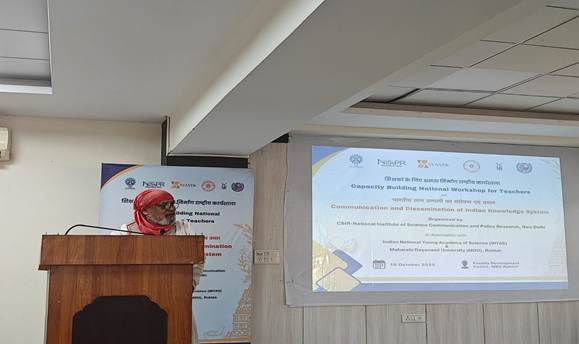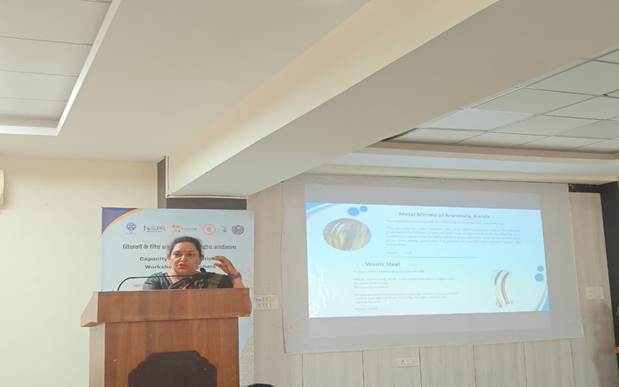Ministry of Science & Technology
Capacity Building National Workshop for Teachers on Communication and Dissemination of Indian Knowledge System (IKS)
Posted On:
21 OCT 2025 11:47AM by PIB Delhi
CSIR-National Institute of Science Communication and Policy Research (NIScPR) organised a Capacity Building National Workshop for Teachers on “Communication and Dissemination of Indian Knowledge Systems” under the national initiative SVASTIK (Scientifically Validated Societal Traditional Knowledge) to communicate scientifically validated traditional knowledge to society, jointly with the Indian National Young Academy of Science (INYAS) under its flagship programme RuSETUp (Rural Science Education Training Utiility Progarmme) and Maharshi Dayanand University (MDU), Rohtak on 16th October 2025 at MDU, Rohtak. More than 100 participants from 75 different institutions registered and actively participated in the workshop.
The programme started with the welcome address by Dr Surender Yadav, MDU followed by the introductory remarks by Dr Geetha Vani Rayasam, Director, CSIR-NIScPR who joined online. She introduced SVASTIK and appreciated the collaborative efforts of CSIR-NIScPR, INYAS, and MDU in taking IKS dissemination to regional institutions and teachers.
Padma Bhushan Dr. Anil P. Joshi, the Chief Guest and Founder of the Himalayan Environmental Studies and Conservation Organization (HESCO), Dehradun delivered a motivational keynote speech. In his discussion of the complex relationships between the economy, ecology, and environment, Dr. Joshi, who is popularly referred to as the "Mountain Man of India", emphasised that traditional Indian knowledge has always been based on sustainability and self-reliance. He encouraged teachers to promote scientific learning within the context of India's indigenous traditional knowledge.
Prof. Rajbir Singh, Vice Chancellor, MDU commended the joint efforts of CSIR-NIScPR, INYAS, and MDU in promoting interdisciplinary initiatives on IKS. He emphasized that the true dissemination of knowledge begins with teachers, who serve as key communicators and change makers in society.
The Vote of Thanks was delivered by Dr. Charu Lata, Coordinator SVASTIK who expressed heartfelt appreciation to all dignitaries, organizers, and participants for their valuable contributions to the success of the workshop. She acknowledged the collective efforts of CSIR-NIScPR, INYAS and MDU in facilitating a meaningful platform for knowledge exchange.
The first technical session of the workshop on “India’s science & technology heritage: From protection to perpetuation” focused on India’s rich and diverse scientific heritage and its continuity in the present era.
Prof. Ranjana Aggarwal, an eminent organic chemist, Outstanding Scientist, CSIR and former Director of CSIR-NIScPR emphasized that a holistic perspective that integrates the natural, social, and spiritual sciences forms the foundation of India's scientific heritage. She pointed out that false information frequently misrepresents traditional knowledge in the digital age, highlighting the importance of clear communication, scientific validation, and educational inclusion. She referred to programs that document and validates traditional practices in multiple languages, such as CSIR-NIScPR's SVASTIK project, the Ministry of AYUSH, AICTE's IKS divisions, and NEP 2020.
Dr. Ashwani Tiwari, Associate Professor, School of Environmental Sciences, JNU, delivered an engaging lecture on the importance of traditional rainwater harvesting systems in addressing India’s growing water scarcity. To encourage local conservation efforts, he advised educators to incorporate traditional water knowledge into environmental education.
Dr. Charu Lata Principal Scientist, CSIR-NIScPR delivered an insightful talk on India’s traditional food wisdom. She also outlined the systematic process followed under SVASTIK from identifying and validating traditional practices to communicating them to the public through digital and social media platforms. She additionally invited the participants to serve as "Brand Ambassadors of SVASTIK" by providing local examples of traditional knowledge from their areas and added that educators and researchers who can link conventional knowledge with verified scientific data are the first to effectively communicate science.
The second session started with an interactive Hands-on Training on traditional knowledge communication conducted by Dr. Paramananda Barman, Senior Scientist and the SVASTIK Team from CSIR-NIScPR. He began by explaining the fundamentals of science communication and discussed its various forms including popular science writing, infographics, podcasts, and social media outreach that help translate scientific concepts for wider audiences. During the session, participants received hands-on training in designing communication materials, and learning how to create visually appealing infographics, posters, and short videos on traditional practices.
At the end of the session, Dr. Raj Mukhopadhyay Scientist, ICAR-Central Soil Salinity Research Institute, Karnal delivered an informative talk on indigenous soil management practices and their role in enhancing soil fertility, microbial activity, and nutrient cycling.
The workshop concluded with an interactive Feedback and Vote of Thanks session, where participants from schools and colleges expressed gratitude for the enriching experience. In the concluding remarks, Dr. Sandhiya Lakshmanan, Senior Scientist, CSIR-NIScPR, thanked all dignitaries, speakers, and participants for their active engagement.



*****
NKR/AK
(Release ID: 2181105)
Visitor Counter : 2043